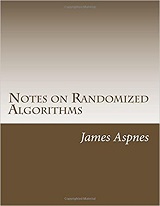
|
FreeComputerBooks.com
Links to Free Computer, Mathematics, Technical Books all over the World
|
|
- Title: Notes on Randomized Algorithms
- Author(s) James Aspnes
- Publisher: Arxiv.org and Yale University; eBook (Creative Commons Licensed)
- License(s): Creative Commons License (CC)
- Paperback: N/A
- eBook: PDF (459 pages)
- Language: English
- ISBN-10: N/A
- ISBN-13: N/A
- Share This:

|
For many applications, a randomized algorithm is either the simplest or the fastest algorithm available, and sometimes both. This book introduces the basic concepts in the design and analysis of randomized algorithms. Discusses tools from probability theory, including random variables and expectations, union bound arguments, concentration bounds, applications of martingales and Markov chains, and the Lovasz Local Lemma.
About the Authors- James Aspnes is a professor in the Computer Science Department at Yale. He is also the Director of Undergraduate Studies for the Computer Science department. His main area of research is distributed algorithms.
- Algorithms and Data Structures
- Probability Theory and Stochastic Processes
- Computational Complexity
- Discrete Mathematics
 Similar Books:
Similar Books:
-
 An Open Guide to Data Structures and Algorithms (Paul Bible, et al)
An Open Guide to Data Structures and Algorithms (Paul Bible, et al)
This textbook serves as a gentle introduction for undergraduates to theoretical concepts in data structures and algorithms in computer science while providing coverage of practical implementation (coding) issues.
-
 Algorithm Design and Analysis (Godfrey Justo)
Algorithm Design and Analysis (Godfrey Justo)
This book is designed to provide you with a solid foundation in algorithmic thinking and equip you with the essential tools and techniques necessary to design and analyze efficient algorithms.
-
 Lecture Notes for the Algorithms (Jeff Erickson)
Lecture Notes for the Algorithms (Jeff Erickson)
This lecture notes uniquely combines rigor and comprehensiveness. It covers a broad range of algorithms in depth, yet makes their design and analysis accessible to all levels of readers. Each chapter is relatively self-contained and can be used as a unit of study.
-
 The Little Book of Algorithms (William Lau)
The Little Book of Algorithms (William Lau)
This workbook is designed to help those learning and teaching Computer Science at secondary school level. The aim of the book is to help students build fluency in their Python programming.
-
 Algorithms: Fundamental Techniques (Macneil Shonle, et al)
Algorithms: Fundamental Techniques (Macneil Shonle, et al)
The goal of the book is to show you how you can methodically apply different techniques to your own algorithms to make them more efficient. While this book mostly highlights general techniques, some well-known algorithms are also looked at in depth.
-
 Think Data Structures: Algorithms and Information Retrieval
Think Data Structures: Algorithms and Information Retrieval
This practical book will help you learn and review some of the most important ideas in software engineering - data structures and algorithms - in a way that's clearer, more concise, and more engaging than other materials. Useful in technical interviews too.
-
 Elementary Algorithms (Xinyu Liu)
Elementary Algorithms (Xinyu Liu)
This book doesn't only focus on an imperative (or procedural) approach, but also includes purely functional algorithms and data structures. It teaches you how to think like a programmer - find the practical efficiency algorithms to solve your problems.
-
 Algorithm Design (Jon Kleinberg, et al)
Algorithm Design (Jon Kleinberg, et al)
This book introduces algorithms by looking at the real-world problems that motivate them. The book teaches a range of design and analysis techniques for problems that arise in computing applications.





